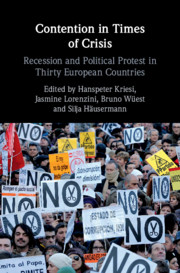Book contents
- Contention in Times of Crisis
- Contention in Times of Crisis
- Copyright page
- Contents
- Figures
- Tables
- Contributors
- Preface and Acknowledgements
- Part I A Study of Protest in Thirty European Countries
- Part II Trends in Protest in the Great Recession
- 4 Overall Trends of Protest in the Great Recession
- 5 All Quiet on the Protest Scene?
- 6 The Return of the Economy?
- Part III Sources of Protest
- Part IV Interaction Between Convention and Contention
- References
- Index
6 - The Return of the Economy?
Issue Contention in the Protest Arena
from Part II - Trends in Protest in the Great Recession
Published online by Cambridge University Press: 13 August 2020
- Contention in Times of Crisis
- Contention in Times of Crisis
- Copyright page
- Contents
- Figures
- Tables
- Contributors
- Preface and Acknowledgements
- Part I A Study of Protest in Thirty European Countries
- Part II Trends in Protest in the Great Recession
- 4 Overall Trends of Protest in the Great Recession
- 5 All Quiet on the Protest Scene?
- 6 The Return of the Economy?
- Part III Sources of Protest
- Part IV Interaction Between Convention and Contention
- References
- Index
Summary
Since the 1970s, the focus of contentious protest, as well as of the corresponding research, has increasingly moved from economic issues to the cultural issues associated with the new social movements. With Europe experiencing the most severe economic crisis in decades, we ask if the return of hard times has changed the distribution of contention over the different policy domains. Drawing on a dataset covering more than 30.000 protest events in thirty European countries from 2000 to 2015 and the issues and actors involved in each event, we analyse how the salience of cultural, political, and economic issues in the protest arena changes over time across countries and regions. We find evidence for a reinvigoration of economic protest particularly in southern Europe, a region that was strongly affected by the economic crisis. However, the varying crisis experiences also served to channel economic grievances into other issues: Governments deflected blame for austerity packages onto international institutions and right-wing challengers mobilized economic fears by promising more exclusive welfare benefits. Hence, the economic crisis was also addressed in political and cultural terms. Finally, we show that when the Euro-crisis ended, the migration crisis began to affect the protest arena.
- Type
- Chapter
- Information
- Contention in Times of CrisisRecession and Political Protest in Thirty European Countries, pp. 128 - 146Publisher: Cambridge University PressPrint publication year: 2020
- 2
- Cited by



